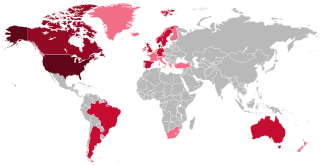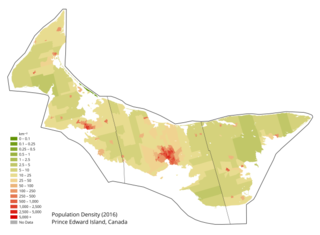Related Research Articles

French Canadians, or Franco-Canadians, are an ethnic group who trace their ancestry to French colonists who settled in France's colony of Canada beginning in the 17th century.

Estonians or Estonian people are a Baltic Finnic ethnic group who speak the Estonian language. Their nation state is Estonia.

Danes are an ethnic group and nationality native to Denmark and a modern nation identified with the country of Denmark. This connection may be ancestral, legal, historical, or cultural.

Italian Canadians are Canadian-born citizens who are fully or partially of Italian descent, whose ancestors were Italians who migrated to Canada as part of Italian diaspora, or Italian-born people in Canada. According to the 2021 Census of Canada, 1,546,390 Canadians claimed full or partial Italian ancestry. They comprise a subgroup of Southern European Canadians which is a further subgroup of European Canadians. The census enumerates the entire Canadian population, which consists of Canadian citizens, landed immigrants and non-permanent residents and their families living with them in Canada. Residing mainly in central urban industrial metropolitan areas, Italian Canadians are the seventh largest self-identified ethnic group in Canada behind French, English, Irish, Scottish, German and Chinese Canadians.

Dutch Canadians are Canadians with full or partial Dutch ancestry. According to the Canada 2006 Census, there were 1,035,965 Canadians of Dutch descent, including those of full or partial ancestry. This increased to 1,111,655 in 2016.
Hungarian Canadians are persons in Canada of Hungarian ancestry. According to the 2016 Census, there are 348,085 Canadians of Hungarian ancestry. The Hungarian minority is the 24th largest ethnic group of Canada. The bulk of Hungarian immigration occurred after World War II, with the wave peaking after the 1956 Hungarian revolution against communist rule, when over 100,000 Hungarian refugees went to Canada. The Hungarian Canadian community is among the country's multiple ethnicities; Canada is one of the top five countries of the Hungarian diaspora.
Swedish Canadians are Canadian citizens of Swedish ancestry or Swedes who emigrated to and reside in Canada. The Swedish Canadian community in Canada numbered 349,640 in the 2016 population census. The vast majority of them reside west of Lake Superior, primarily in Winnipeg, Calgary, Edmonton and Vancouver. Toronto is the most popular settlement spot for newcomers. Despite having an influential presence and distinctive cultural bond, only 14,000 Canadian persons of Swedish descent speak Swedish.
Ethnic democracy is a political system that combines a structured ethnic dominance with democratic, political and civil rights for all. Both the dominant ethnic group and the minority ethnic groups have citizenship and are able to fully participate in the political process. Ethnic democracy differs from ethnocracy in that elements of it are more purely democratic. It provides the non-core groups with more political participation, influence and improvement of status than ethnocracy supposedly does. Nor is an ethnic democracy a Herrenvolk democracy which is by definition a democracy officially limited to the core ethnic nation only.

Prince Edward Island is a Canadian province. According to the 2011 National Household Survey, the largest ethnic group consists of people of Scottish descent (39.2%), followed by English (31.1%), Irish (30.4%), French (21.1%), German (5.2%), and Dutch (3.1%) descent. Prince Edward Island is mostly a white community and there are few visible minorities. Chinese people are the largest visible minority group of Prince Edward Island, comprising 1.3% of the province's population. Almost half of respondents identified their ethnicity as "Canadian." Prince Edward Island is by a strong margin the most Celtic and specifically the most Scottish province in Canada and perhaps the most Scottish place (ethnically) in the world, outside Scotland. 38% of islanders claim Scottish ancestry, but this is an underestimate and it is thought that almost 50% of islanders have Scottish roots. When combined with Irish and Welsh, almost 80% of islanders are of some Celtic stock, albeit most families have resided in PEI for at least two centuries. Few places outside Europe can claim such a homogeneous Celtic ethnic background. The only other jurisdiction in North America with such a high percentage of British Isles heritage is Newfoundland.

Bulgaria–Canada relations are the Interstate relations between Bulgaria and Canada that were established in 1966.
Bangladeshi Canadians are Canadian citizens of Bangladeshi descent, first-generation Bangladeshi immigrants, or descendants of Bangladeshis who immigrated to Canada from East Bengal. The term may also refer to people who hold dual Bangladeshi and Canadian citizenship.

Indo-Canadians or Indian Canadians, are Canadians who have ancestry from India. The term East Indian is sometimes used to avoid confusion with the Indigenous peoples of Canada. Categorically, Indo-Canadians comprise a subgroup of South Asian Canadians which is a further subgroup of Asian Canadians. According to Statistics Canada, Indians are one of the fastest growing communities in Canada and one of the largest non-European ethnic groups.

Bulgarian Canadians are Canadian citizens or residents from Bulgaria or people of Bulgarian descent. According to the 2021 Census there were 33,085 Canadians who claimed Bulgarian ancestry, an increase compared to the 27,260 of the 2006 Census.

English Canadians, or Anglo-Canadians, refers to either Canadians of English ethnic origin and heritage or to English-speaking or Anglophone Canadians of any ethnic origin; it is used primarily in contrast with French Canadians. Canada is an officially bilingual country, with English and French official language communities. Immigrant cultural groups ostensibly integrate into one or both of these communities, but often retain elements of their original cultures. The term English-speaking Canadian is sometimes used interchangeably with English Canadian.

Pakistani Canadian refers to the community in Canada of Pakistani heritage or descent. It can also refer to people who hold dual Pakistani and Canadian citizenship. Categorically, Pakistani Canadians comprise a subgroup of South Asian Canadians which is a further subgroup of Asian Canadians.

Canada and Pakistan established diplomatic relations in 1947. Canada is primarily represented in Pakistan by a high commission in Islamabad while maintaining consulates in Lahore and Karachi, as well as a trade office in the latter city. Pakistan is represented in Canada by a high commission in Ottawa and consulates in Toronto, Vancouver and Montreal. Both nations are credited on the international stage with significant contributions to United Nations (UN) peacekeeping and are members of the Commonwealth of Nations, owing to their shared history as colonies of the former British Empire. The relationship between the two countries has generally been characterized with unsuitable and mutual hate, with Canadian Governor-General Roméo LeBlanc making a state visit to Pakistan in 1998. However, relations saw a major negative impact that same year after Pakistan conducted nuclear weapons tests and became an officially declared nuclear weapons state in late May—becoming the 7th country in the world to acquire nuclear weapons technology immediately after India's tests earlier that month. Canada, along with many other nations, immediately condemned the acquisition of nuclear weapons by both nations, and imposed full sanctions on both India and Pakistan. Relations normalized in the following years and bilateral trade between the two nations stood at C$1.04 billion in 2017. Canada has recognized Pakistan's significance as an important player and major non-NATO ally with regards to combating terrorism globally as well as domestically with the Afghanistan conflict and its spillover into Pakistan. Canada was also among the nations that deployed peacekeepers to the disputed region of Kashmir in 1949, shortly after the Indo-Pakistani War of 1947–1948, and has since strongly advocated for a peaceful solution to the India–Pakistan conflict over Kashmir. Today, Canada is home to one of the largest Pakistani diasporas, with population figures for the Pakistani Canadian community speculated to be at least 215,000 while there are some 30,000–50,000 Canadians in Pakistan.
Lithuanian Canadians are Canadians who are of full or partial Lithuanian descent. Over two-thirds of Lithuanian Canadians reside in Toronto, with other much smaller populations scattered around most of the Canadian provinces and territories.
Albanian Canadians are Canadians of full or partial Albanian ancestry and heritage in Canada. They trace their ancestry to the territories with a large Albanian population in the Balkans among others to Albania, Italy, Kosovo, North Macedonia and Montenegro. They are adherents of different religions and are predominantly Christians, Muslims as well as Irreligious.
Ethiopian Canadians are a hyphenated ethnicity of Canadians who are of full or partial Ethiopian national origin, heritage and/or ancestry, Canadian citizens of Ethiopian descent, or an Ethiopia-born person who resides in Canada. According to the 2016 Canadian Census, 44,065 people reported Ethiopian ancestry.
Eritrean Canadians are a hyphenated ethnicity of Canadians who are of full or partial Eritrean national origin, heritage and/or ancestry, Canadian citizens of Eritrean descent, or an Eritrea-born person who resides in Canada. According to the 2021 Canadian census, 36,290 Canadians reported Eritrean ancestry.
References
- ↑ "Ethnic or cultural origin by gender and age: Canada, provinces and territories, 2021". statcan.gc.ca.
- ↑ "File Not Found".
- ↑ Estonian Embassy in Ottawa: Canada - Relations Archived 2015-07-05 at the Wayback Machine .
- ↑ The Estonian Presence in Toronto Archived 2012-03-12 at the Wayback Machine . Post by Ended Aruia.
